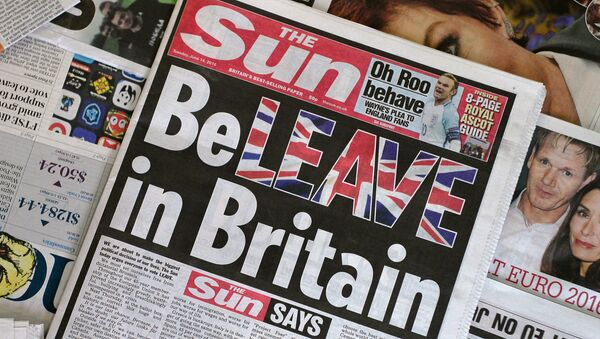"If we consider the EU as a family it’s clear that Britain wasn’t the original member of this family. The UK joined the bloc later than its core members. Moreover, London managed to save its identity, including its national currency. Britain always said it’s not part of the continental Europe," Lauenstein said in an interview with Sputnik.
After the results of the Brexit vote were revealed, the other 27 member countries as well as the main EU institutions called on London not to delay the withdrawal procedure.
"Usually, in the event of divorce, the people are shocked. Then they realize the situation and try to save it, but it’s too late. On the contrary, Brexit was not unexpected. The vote was announced long ago, and polls showed there was a chance of Britain leaving the EU. We can say that Britain has expressed discontent of its relations with Brussels. But it’s too early to say what both parties will do after the procedure is completed," he pointed out.
Lauenstein said that British eurosceptics came up with emotional arguments during their campaign and this is why they won.
"It was like a collision of two different worlds. On the one hand, those calling to remain in the EU used rational arguments and they were right. On the other hand, eurosceptics used emotional arguments that often were weak or even false. But emotional arguments always win in the short run," the specialist explained.
According to the psychologist, pro-EU activists should have utilized in their campaign the notion of Europe not only as a political and economic union, but first of all as a common cultural and historic space.
"Research reveals that those identifying themselves with Europe also think about such values as freedom, peace, and cooperation of different cultures. At the same time, those against the EU think about economy, politics, and European institutions. But people should understand that first of all Europe is about common cultural values," he said.
Now, Europe is seeing an unprecedented rise of nationalist and populist movements. After Brexit, a number of anti-EU politicians have said they would like a similar vote in their country, including in France and the Netherlands. Thus, the EU has faced a serious challenge.
"The Lisbon Treaty mentions European values but it’s still more about politics and regulation. Unfortunately, many people don’t feel they belong to Europe, there is no emotional component. But for some people being part of Europe is very important, like in the example of Brexit. Those identifying themselves as Europeans have been hurt the most by this vote," Lauenstein said.
According to the psychologist, if more EU residents feel themselves Europeans it would contribute to decrease the popularity of nationalist parties and populist ideas.
"Populists are playing the emotional card. But in fact they cannot offer any credible idea or value. If the EU could offer something emotional and something substantial nationalist mottos would lose attractiveness. People listen to them not because they’re looking for the best argument but because they need something to rely on at a time of uncertainty," Lauenstein concluded.





